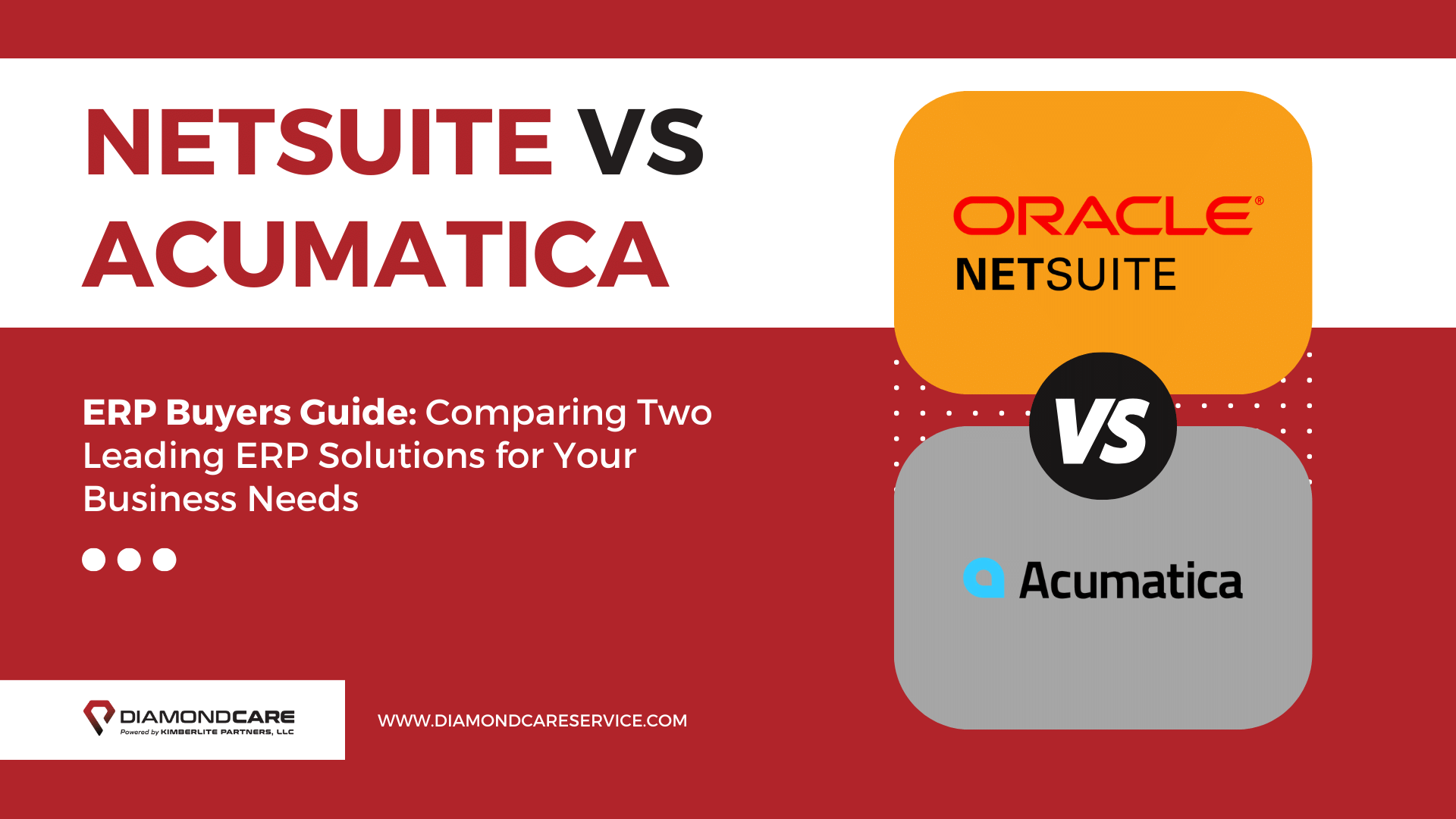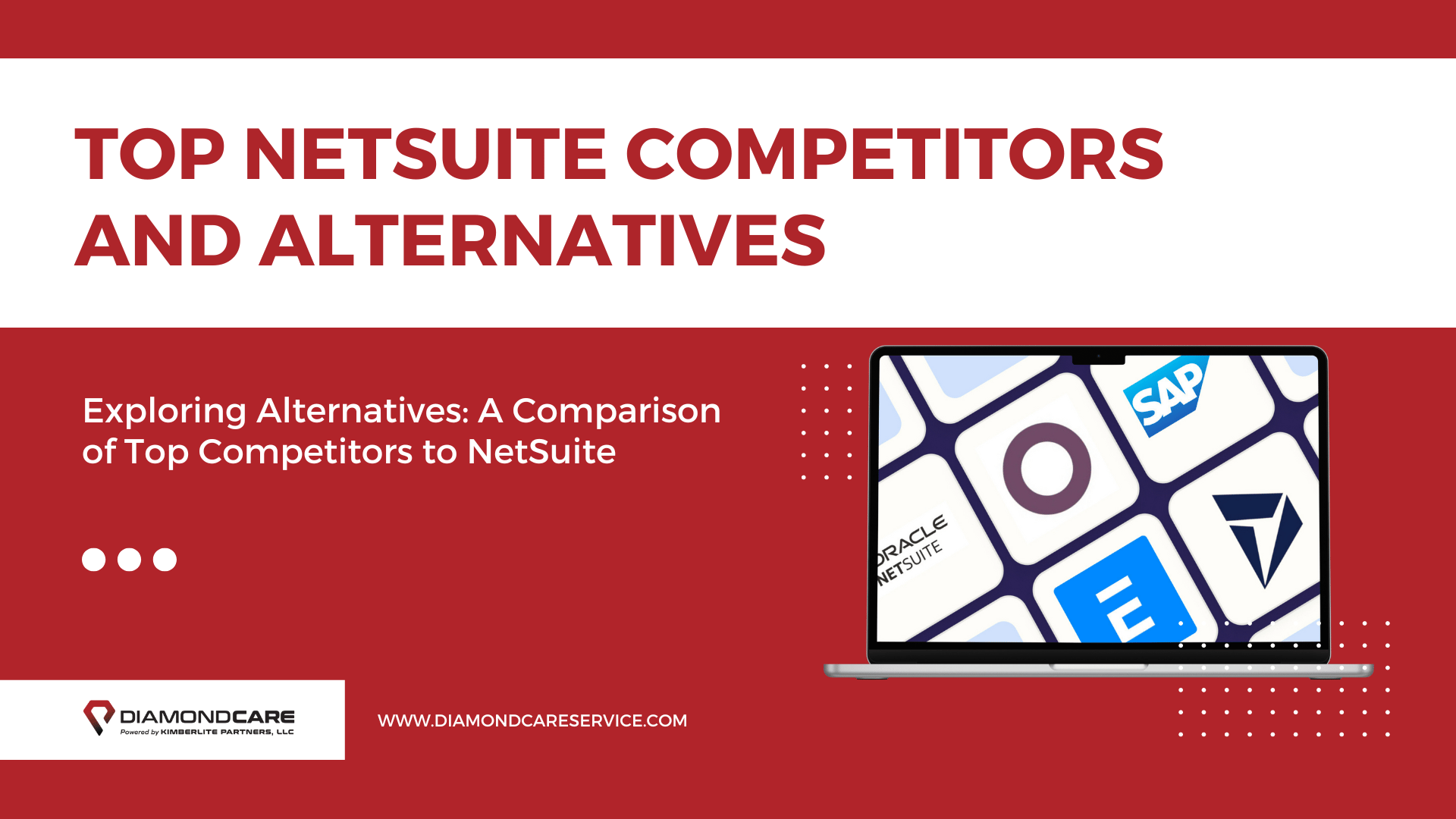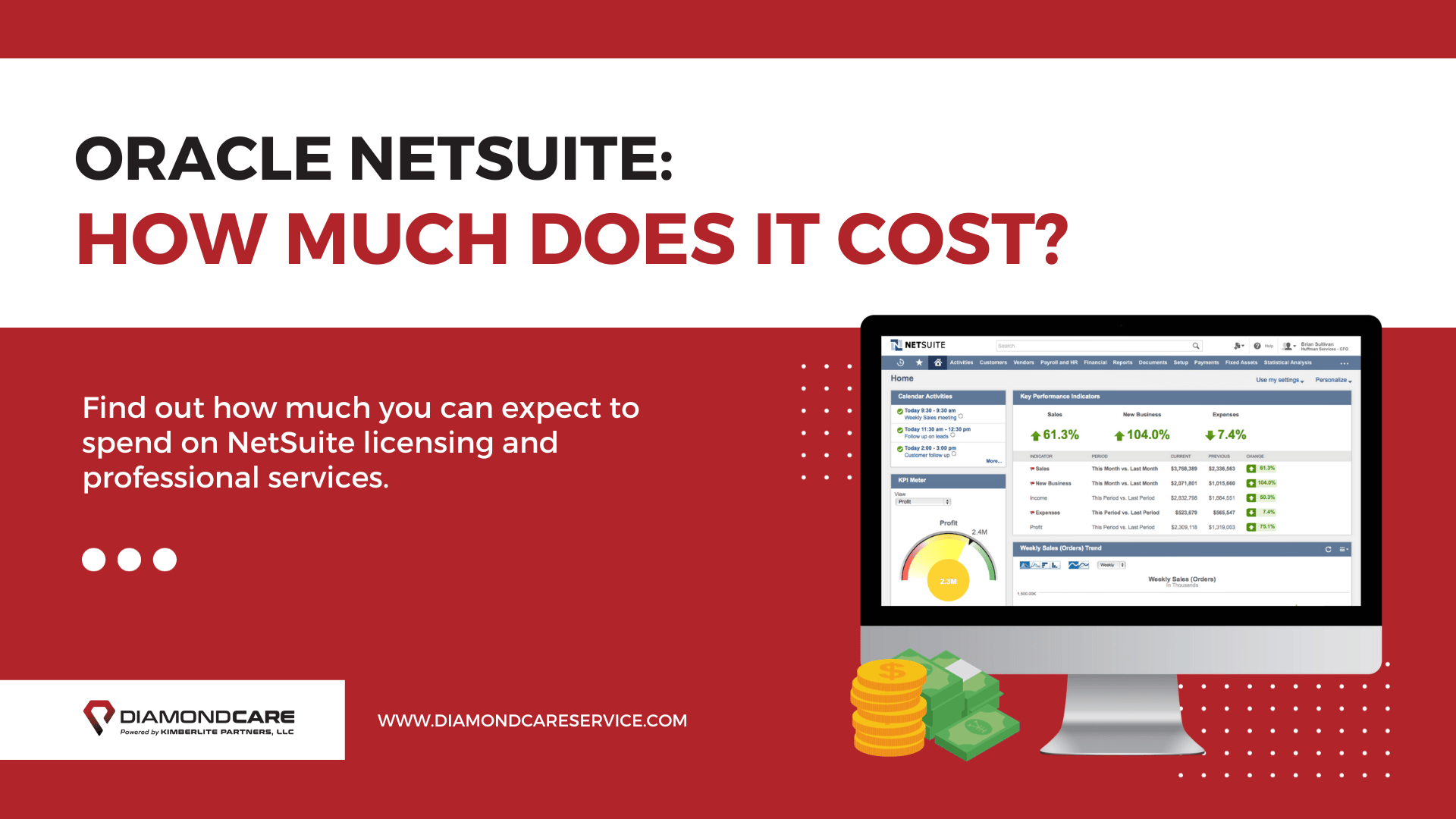1 min read
ERP Buyers Guide: Top NetSuite Competitors and Alternatives
In the complex and ever-evolving world of enterprise resource planning (ERP) solutions, NetSuite stands out as a significant contender. Yet, the...

As the world of enterprise technology continues to evolve, it becomes increasingly vital for businesses to choose the right ERP solution that will enhance efficiency and scalability. This decision-making process often comes down to NetSuite and Acumatica, two leading providers in the field.
With that in mind, our analysis aims to illuminate the key differences between these two platforms, equipping business leaders with the necessary insights to make informed decisions that align with their strategic goals and operational requirements.
NetSuite, established in 1998 and later acquired by Oracle in 2016, has become a global leader in providing cloud ERP solutions to a diverse range of industries, including retail, manufacturing, and software. With a focus on optimizing key business processes, NetSuite offers a comprehensive suite of tools and features.
By harnessing the power of real-time analytics, customizable dashboards, and intelligent automation, NetSuite empowers businesses to enhance their efficiency, gain valuable insights, and adapt with agility. This all-in-one platform seamlessly integrates financial and accounting management, CRM, eCommerce, inventory, and HR tools, providing a flexible and scalable solution.
One of the standout features of NetSuite is its ability to cater to specialized needs without requiring extensive coding expertise. Through configuration of workflows, add-on modules from the SuiteApps ecosystem, and tailored integrations, businesses can easily customize NetSuite to meet their unique requirements. Furthermore, with AI and machine learning capabilities built-in, NetSuite remains future-ready and at the forefront of technological advancements.
NetSuite's commitment to innovation and customer satisfaction has solidified its position as a trusted ERP solution provider, serving over 18,000 customers worldwide. With its user-friendly interface, robust support, and flexible pricing options, NetSuite continues to be the go-to choice for businesses seeking a comprehensive and adaptable cloud ERP solution.
Acumatica, established in 2008 and recently acquired by private equity firm EQT in 2019, is a trusted provider of adaptable ERP solutions to over 8,000 mid-market businesses. These solutions are specifically tailored to meet the unique needs of different industries and growth stages.
What sets Acumatica apart is its innovative pricing model, which calculates costs based on the computing resources utilized each month rather than traditional per user license fees. This approach ensures transparency and cost-effectiveness, allowing businesses to align their spending directly with system demands as operational needs fluctuate. However, it is worth noting that for larger workforces, this resource-based pricing may exceed alternative user-based fees.
Acumatica's software offers a wide range of essential functionalities, including financial reporting, inventory and production management, CRM, and data analytics. Moreover, it empowers businesses to customize workflows, dashboards, and integrations with popular platforms like Office 365 through open APIs.
One of the key advantages of Acumatica is its deployment flexibility. Organizations have the freedom to choose between public or private cloud deployment or even on-premise, depending on their specific IT control, compliance, and scalability requirements. This flexibility gives Acumatica an edge over ERP suites that are restricted to a single environment.
At their foundation, both NetSuite and Acumatica deliver core business functionalities like financial management, inventory control, warehouse operations, CRM and eCommerce. This demonstrates their comparability as centralized platforms supporting end-to-end needs.
Differences emerge when it comes to HR tools and professional services automation - features NetSuite has that benefit HR managers needing consolidated data and service teams requiring streamlined workflows.
For global enterprises, both systems provide 30+ language and 160+ currency options for localized experiences when expanding into new countries and regions. This enables seamless subsidiaries management for CFOs overseeing international financial consolidation.
When comparing NetSuite and Acumatica, it is important to consider the major contrasts between the two ERP solutions. These contrasts have implications for key decision makers within organizations.
One major contrast is the difference in implementation timelines. This has a significant impact on operations leaders and owners. NetSuite offers pre-configured industry cloud templates, which can accelerate the launch of the ERP system. On the other hand, Acumatica takes a fully customizable approach, starting from a blank slate. This means that the implementation process for Acumatica can often span months, while NetSuite can be up and running in ~100 days.
Another important contrast is the level of IT infrastructure control provided by each solution. This has a direct impact on chief technology officers. Acumatica caters to organizations that require on-premise or hybrid deployments, giving them more control over hosting location, servers, and hardware-specific customization. In contrast, NetSuite is cloud-only, which limits the environment flexibility, especially for highly regulated sectors.
The approaches to cost management also differ between NetSuite and Acumatica, which has an impact on finance leaders. NetSuite operates on a user-based pricing model, which scales predictably with workforce growth. However, it penalizes role-specific access. On the other hand, Acumatica uses a consumption-driven model, aligning the cost to the fluctuating usage of computing resources rather than the number of employees. Finance leaders need to carefully plan around data infrastructure demands to ensure cost effectiveness.
Customer support service quality is another significant contrast between NetSuite and Acumatica, impacting department managers. NetSuite provides direct end-to-end global support services, ensuring prompt resolution of issues and comprehensive assistance. In contrast, Acumatica relies on a decentralized partner network model, which can vary in skillsets and capabilities. This means that evaluating the capabilities and expertise of third-party partners is crucial to prevent ticketing delays or cost overruns downstream.
Considering these major contrasts between NetSuite and Acumatica is essential for businesses when determining the most suitable ERP solution for their specific needs. Each solution has its own strengths and weaknesses, and decision-makers need to weigh these factors carefully to make an informed choice that aligns with their operational requirements and growth objectives.
For any ERP system, ongoing support serves as a vital resource for resolving issues, facilitating growth and ensuring long-term success. Here NetSuite and Acumatica take fundamentally different approaches.
NetSuite structures its support offerings in tiered levels catering to diverse needs. Free online access equips users with solutions to common questions. Premium subscriptions deliver priority assistance by phone for system failures or technical bugs. The highest level of NetSuite support provides dedicated account managers for strategic optimizations.
By contrast, Acumatica relies entirely on its partner network to deliver post-sales support and training. This gives customers flexibility in selecting their ideal support provider, but places the impetus on them to proactively secure those vital services instead of receiving standardized resources directly from the software vendor itself.
For scaling companies dependent on their ERP, NetSuite’s direct support system may alleviate more risk. Those seeking a targeted provider aligned to their industry or needs might value Acumatica’s decentralized model.
NetSuite’s support infrastructure offers a tiered approach to customer service, catering to various business needs from basic troubleshooting to advanced system optimization. This strategic framework ensures that organizations navigating the complexities of ERP implementation challenges receive the appropriate level of support.
Customizable Support Plans: Tailored to the specific stages of NetSuite implementation and post-launch needs.
Dedicated Account Management: For ongoing strategic advice beyond the initial NetSuite support phase.
24/7 Access to NetSuite’s Knowledge Base: A resource for self-service troubleshooting and learning.
Certified Partner Network: Offers additional layers of Acumatica implementation support and specialized services.
Advanced Customer Support (ACS): Targets complex issues, including those arising during the pivotal phases of ERP implementation challenges, ensuring business continuity and optimization.
Acumatica takes a different approach to customer support compared to NetSuite. Instead of relying on a structured tiered support system, Acumatica leverages its partner network to provide comprehensive customer support services. This strategic approach allows for a high level of customization and specialized assistance, making the support experience more personalized than NetSuite's centralized structure.
However, it's important to note that because Acumatica relies on third-party providers for support, the consistency and quality of service may vary depending on the chosen partner. While this approach offers flexibility and industry-specific expertise, businesses must carefully select partners with proven track records to ensure they receive the level of support that aligns with their needs and the standards set by NetSuite.
NetSuite's pricing model revolves around licensed users, seamlessly scaling with an organization’s headcount growth. It provides flexibility through additional business-specific modules, customization options, and tiered global support plans that allow shaping a comprehensive platform adapted to diverse operational needs. For example, supplemental modules for ecommerce, field service management or advanced manufacturing can enhance an ERP deployment.
However, the per-employee cost beyond core licenses can become prohibitively expensive for large national or multinational workforces, including contingent workers unlikely to directly access the system. This creates opportunities for alternatives like Acumatica to help lower software expenses.
Acumatica Pricing Offers Predictability Tied to Consumption
In contrast to employee-specific pricing, Acumatica bases costs on utilized compute resources, storage, and bandwidth per month plus a baseline subscription. Monthly fees directly scale with business expansion while a fixed implementation license brings initial predictability. However, for organizations with expansive system access privileges for employees, per-user fees may more efficiently curb licensing costs long-term.
Considering the Long-Term Impact
Though Acumatica’s model spotlights inefficiencies, NetSuite provides long-term value through robust integration scalability. Evaluating true total cost against current and future platform needs allows informed decisions. For focused midmarket firms aggressively scaling, Acumatica’s transparent pass-through consumption costs facilitate growth planning without inflating expenses from unused licenses should needs fluctuate.
In conclusion, the selection between NetSuite and Acumatica for an Enterprise Resource Planning system necessitates a thorough evaluation of organizational needs. This evaluation should include considerations of scalability, customization, implementation, support, and cost.
Ultimately, the decision between NetSuite and Acumatica will depend on aligning the ERP system’s capabilities with the strategic goals and operational demands of the business. It’s essential to carefully evaluate the specific needs of the organization before making a final decision.

1 min read
In the complex and ever-evolving world of enterprise resource planning (ERP) solutions, NetSuite stands out as a significant contender. Yet, the...

When considering the adoption of any software or technology, it is essential to have a clear understanding of the costs involved. NetSuite, a widely...

Searching for an all-in-one solution to elevate your business? Dive into the world of NetSuite—a trusted cloud ERP adopted by numerous organizations...